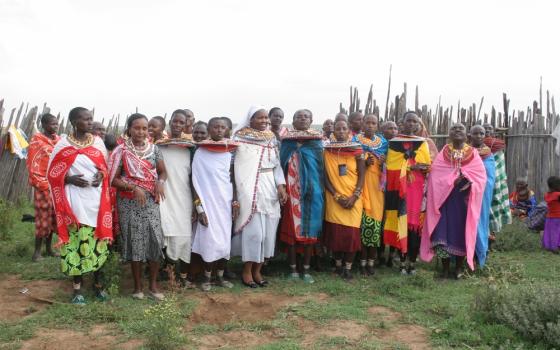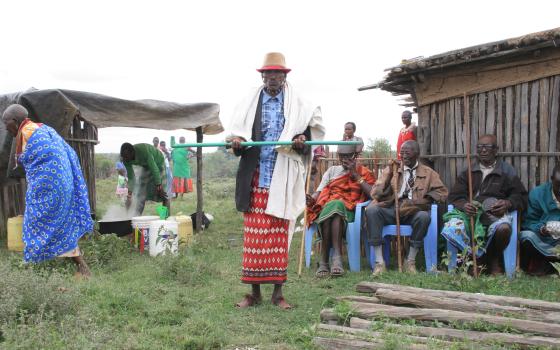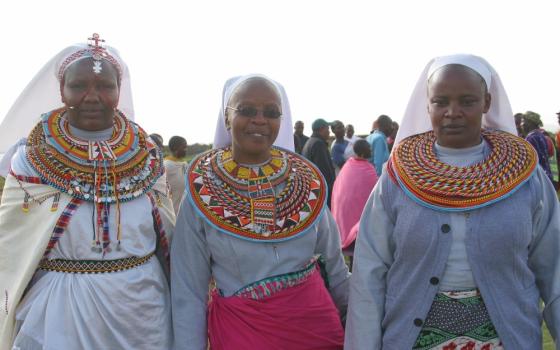With their necks encircled with beads and massive bracelets jangling on their wrists, the women and men from Lkichaki village, Lodokejek division, in the Samburu region of Kenya welcomed Sr. Roseline Lenguris back to her home with song and dance.
The deeply rhythmical dances, a ritual of the Samburu tribe — a traditional people akin to the Maasai — are performed during the celebration of important passages of life, such as circumcision and marriage. But this was a different celebration, the first of its kind in the Samburu community.
It was Sr. Roseline Lenguris' first time at home since taking her final vows with the Sisters of Mary Immaculate community.
"They received me very well, and they are not expecting any cows or grandchildren from me," said Lenguris, with a small smile.
This wasn't always the case.
Lenguris is the first woman from the Samburu tribe to become a Catholic sister. When the elders of the Lkichaki village, on the windswept plains of central Kenya, heard that Lenguris wanted to pursue such a vocation, their response was unanimous.
"You had rather be dead than to live in this world without bearing children like a dry stick," they told Lenguris, a sentence that still makes her tear up, more than 15 years later.
"That was like a curse by the elders upon me. The concept of becoming a sister is foreign to them because it has never happened in this community before. All they understood was that I wasn't going to get married and wasn't going to bear any children for the community," Lenguris said.
The Samburus are semi-nomadic pastoralists, tracing their roots to the Nile region of South Sudan. They herd mainly cattle but also keep goats, camels and sheep as their source of livelihood. They are closely related to but distinct from the Maasai, a tribe that is well known internationally for their warrior culture and intricate beadwork.
Located within the hot, relatively low country that heralds Kenya's vast northern deserts and semi-deserts, the Samburu still lead lives based on ancient traditions, largely defying modern trends.
Girls grow up with one purpose: to be married and then bear children for the clan. Families receive a dowry of cattle for their daughters upon marriage, which makes many poor, rural households see girls as an investment. Because it makes financial sense to marry off a daughter quickly in order to receive the dowry, the brides are often children.
Livestock are integral to the Samburu lifestyle, providing food and a livelihood. Marriage customs especially, including the wedding and the dowry paid for a bride, revolve around the domestic animals, highlighting their importance in the rhythm of life cycles.
A family may need cows they receive from a daughter's marriage as dowry in order to use them to marry off their son — to provide a dowry for his marriage; this can expedite marriage for girls who are not ready.
Children are of utmost importance in the culture because that is the way to increase wealth. If a woman does not provide children, the husband can take a second wife.
'Two families are dead now'
"Being a nun means you are not going to get children, and to our traditional norms it's not acceptable, it's not allowed," explains Fr. Peter Leseketeti, of the Catholic diocese of Maralal in Samburu County. Leseketeti was the first priest from the Samburu tribe. "Once you are a mature girl, you get circumcised and you are married off to go start a family, to get kids and expand the clan. Failure to do that, it is considered a curse upon you. It is an abomination in our tradition not to have children."
When Leseketeti decided to become a priest, he faced the same resistance from the community as Lenguris. His friends, relatives and the village elders thought he was out of his mind, and none attended his ordination. His father disowned him and called him "misplaced and abnormal," Leseketeti recalled.
"You will never see your offspring," Leseketeti remembers were his father's exact words to him. "By becoming a priest you are killing the family."
When Lenguris decided to take the path of sisterhood, the elders came to Leseketeti and told him, "These two families are dead now."
"The women have no rights in this community," Leseketeti said. "They cannot decide anything for themselves without the approval of the men. The elders who are men make all the decisions. They decide who marries their daughters, they decide if they go to school or not, they marry off the girls at a very early age even if the women think it's not right."
Peinan Lenguris was married at 18 to Lenguris' cousin a year ago, hence taking up the family's surname. Her own family did not allow her to go to school. When she was married, Peinan says, her relatives were offered four cows and two goats. She had really hoped to get some education, but since she was a young girl, she was forced to spend her days herding her father's goats.
"I am illiterate," said Peinan. "I have never been to school even one single day. I do not know how a classroom looks like. The cows offered were few, because I was a bit older, 17 years old. They had taken time to get me a suitor and, the older you are and less educated, [the fewer] cows your family gets. I wasn't given a chance to say what I wanted because I'm a woman and women here don't talk. It's a very hard life."
The power of words
The power of Samburu elders is linked to the strong belief in the potency of their curses. This underpins their authority over arranging marriages, their acquisition of multiple wives and their threats directed at those who fail to adhere to their traditions.
Though the elders occupy a very important place within the Samburu society and all the power rests with them, it is uncommon for an elder to curse a junior. Curses are reserved for cases of extreme disrespect.
When the elders cursed Lenguris, telling her, "You had rather be dead than live in this world without bearing children like a dry stick," she was shocked and then furious.
At first, she was scared, thinking of the repercussions of such words from the elders. Lenguris remembers she thought she would die if she didn't obey. Then, drawing on her Christian education, she convinced herself that no curse would come upon anyone who believes in God. She disdained the elders at that moment.
"At that point I felt very angry, and if I had had any weapon I would have hit them really hard with it," said Lenguris. "They had already denounced me and termed me an outcast because I wasn't going to give the community children. That's what they take women for in this community. We have no right to decide what we want to do with our lives."
How to delay a marriage
Defying this cultural demand of having children is seen as a sign of disrespect to the family and the community as a whole. A girl is immediately termed an outright outcast for daring to think there is any other purpose for her — or taking the bold step to follow her dream.
A few girls in the Samburu community, inspired by Lenguris' own decision to follow her dream, have succeeded in convincing the elders to delay marriage until they were able to get some education. They were able to do so only with a promise to get married immediately after school.
Lenguris did that in order to be able to finish her primary school education.
When she was 13, the village elders, led by her uncles, came to her father's house with a suitor to marry her. At the time, Lenguris hadn't yet taken the exams for the end of primary school (7th grade). She pleaded with the elders to allow her to sit for the exams then get married soon after.
"Even when I made that promise, deep inside my heart I knew I was not for marriage," said Lenguris. "I had a different calling, but the elders would never have understood. I was just buying time. All I wanted at that moment was to join high school."
Her father, Daniel Lendikir Lenguris, was not aware of the plans by his brothers and the village elders to marry off his daughter. The elders have the monopoly on getting husbands for the young girls without even informing their fathers.
After Lenguris' school exams, the elders returned with a suitor, but she explained to her father that she still wanted to further her education. Her father, a catechist at the local Catholic parish, supported her decision to join secondary school, but the elders would hear none of it. Her mother had already prepared for her wedding as ordered by the elders, and the elders had already received the cows for her dowry.
"There is no way the elders were going to return those cows to the suitor," said Lenguris. "So they became violent, threatening to beat me up and to curse my entire family for defying the community's traditions. This forced me to run away to the local Catholic parish. The priest in charge helped me, and I was able to go through my secondary school education."
Lenguris knew this decision by the parish was bound to bring conflict with the community. So, the priest in charge at the time, Fr. Adolfo Ferero, found her a Catholic family she could live with away from the parish for the four years while she undertook her secondary education.
Though her father was not able to pay her school fees (to avoid confrontation with the elders), he supported her decision and encouraged her to follow her dream. The parish paid her school fees.
"It was a miracle that my father stood by me because, when the elders decide no one can defy them, not even your own father can defend you," said Lenguris.
After finishing secondary school, Lenguris announced to her father and the elders that she wanted to become a nun. The elders were furious, cursing her and trying to force her to get married and have children.
Lenguris' father, who later repaid the dowry with some of his cows, defied the elders and gave his daughter the go-ahead to join the Sisters of Mary Immaculate convent. Her biological sisters, who are also educated, fully supported her, and her oldest sister is a teacher. Her brothers took the side of the elders, however and wanted her to marry.
Catholicism is not widespread in Samburu, and Lenguris' father is among the few converted Christians in the community. He was the first Catholic catechist in the region where Christian missionaries have proselytized the Maasai for many years with little success. But within the last decade, a few from the Samburu community have converted, including Lenguris' father. He has helped the church in fighting negative traditions in the community like female genital mutilation, early marriages and polygamy.
When 86-year-old Daniel Lenguris supported his daughter's decision to continue with her education and later became a nun, the elders were not happy and threatened to segregate his family from the community. His two wives, one with whom he ended a marital relationship after his conversion to Catholicism but whom he still supports financially, have backed him in his decision. Sr. Lenguris' mother prepared for her wedding as per the orders from the elders, but when her husband supported their daughter's decision to further her education, she stepped back.
Lenguris took her final vows on April 26, 2016, and reconciled with her relatives and the elders. Her brothers have since changed their minds and lauded her for the accomplishment.
During the celebrations held when Lenguris returned home as a fully professed sister for the first time on August 8, 2016, Daniel Lenguris said he would allow any other of his daughters to become a sister if they so wished. He has 11 children from his two wives: five girls and seven sons.
"Looking at how Roseline has turned out to be a fine girl, I know it is a good thing and I would allow any other of my daughters to become sisters," he said. "It is good for parents to let their girls follow their dreams, and as a father I would not oppose whatever they decide. Let them serve God."
The elders, who came to welcome her back home after her final vows, now seem comfortable with the decision she made 15 years ago.
Three of the elders who had found a suitor for Lenguris have since passed away, and only one was present at her homecoming ceremony. This elder was the first guest to arrive at her father's home to welcome her back to the village and to give her his blessings, the same blessings that he had denied her 15 years ago when she announced that she was going to pursue sisterhood.
The communitywide celebration for Lenguris, a sign of acceptance and support, prompted some young women to wonder what they could have been.
"I wish I had an opportunity to go to school like her," said Peinan Lenguris, looking at her sister-in-law with admiration. "I would be better placed today. I would really have liked to become a nun like her."
Lenguris has now embarked on a process of enlightening the elders on the rights of women and girls. When she arrived in the village for her celebration, she held a meeting with all the elders where she talked to them about the importance of taking their daughters to school and allowing them to follow their dreams. She says they all expressed willingness to permit their girls to go to school.
"We have given you a go-ahead," Lenguris recalled that the elders told her. "Go talk to the girls and convince them about school. We have brought them up with the idea of marriage. We might not be able to convince them otherwise."
Lenguris says she started talking to the girls since her first vows in 2008 and has realized the girls need encouragement to be able to make free choices. She says several have enrolled in school, inspired by her example.
Lenguris is now a teacher at Mary Immaculate Primary School in Nanyuki County, neighboring Samburu County to the north. During school holidays, she travels back to her village to meet with girls living there. She goes to areas outside her village in the region to serve as an example in empowering girls to follow their dreams.
"Many of them still believe marriage is what they are meant for, because they grew up being told that by the elders," said Lenguris. "I'm trying to change their mentality."
[Lilian Muendo is a freelance journalist based in Nairobi, Kenya.]









